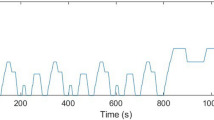Abstract
The fuel economy of a fuel cell hybrid vehicle (FCHV) depends on its power management strategy because the strategy determines the power split between the power sources. Several types of power management strategies have been developed to improve the fuel economy of FCHVs. This paper proposes an optimal control scheme based on the Minimum Principle. This optimal control provides the necessary optimality conditions that minimize the fuel consumption and optimize the power distribution between the fuel cell system (FCS) and the battery during driving. In this optimal control, the final battery state of charge (SOC) and the fuel consumption have an approximately proportional relationship. This relationship is expressed by a linear line, and this line is defined as the optimal line in this research. The optimal lines for different vehicle masses and different driving cycles are obtained and compared. This research presents a new method of fuel economy evaluation. The fuel economy of other power management strategies can be evaluated based on the optimal lines. A rule-based power management strategy is introduced, and its fuel economy is evaluated by the optimal line.
Similar content being viewed by others
Abbreviations
- P stack :
-
stack power (W)
- N cell :
-
number of cells
- V cell :
-
cell voltage (V)
- I stack :
-
stack current (A)
- P fcs :
-
FCS net power (W)
- P aux :
-
power consumption of auxiliary components (W)
- ṁ h2 :
-
fuel consumption rate (g/s)
- M h2 :
-
molar mass of hydrogen (g/mol)
- n :
-
number of electrons acting in the reaction
- F :
-
Faraday constant (C/mol)
- λ :
-
hydrogen excess ratio
- V :
-
open circuit voltage (V)
- R :
-
internal resistance (Ohm)
- Q bat :
-
battery capacity (C)
- P bat :
-
battery power (W)
- J :
-
performance measure (g)
- t 0 :
-
initial time (s)
- t f :
-
final time (s)
- p :
-
costate (g)
- H :
-
Hamiltonian (g/s)
- η fcs :
-
efficiency of the FCS
- FCHV:
-
fuel cell hybrid vehicle
- FCS:
-
fuel cell system
- OCV:
-
open circuit voltage
- SOC:
-
state of charge
- LHV:
-
lower heating value
References
Bernard, J., Delprat, S., Buechi, F. and Guerra, T. M. (2006). Global optimization in the power management of a fuel cell hybrid vehicle (FCHV). Proc. IEEE Veh. Power Propuls. Conf., 1–6.
Bernard, J., Delprat, S., Buechi, F. and Guerra, T. M. (2009). Fuel-cell hybrid powertrain: Toward minimization of hydrogen consumption. IEEE Trans. Veh. Technol., 58, 3168–3176.
Bernard, J., Delprat, S., Guerra, T. M. and Buechi, F. (2010). Fuel efficient power management strategy for fuel cell hybrid powertrains. Control Eng. Practice, 18 408–417.
Delprat, S., Lauber, J., Guerra, T. M. and Rimaux, J. (2004). Control of a parallel hybrid powertrain: Optimal control. IEEE Trans. Veh. Technol. 53,3, 872–881.
Ehsani, M., Gao, Y. M. and Emadi, A. (2010). Modern Electric, Hybrid Electric, and Fuel Cell Vehicles. CRC Press 2nd Edn. Boca Raton. 459–469.
Kim, M. J. and Peng, H. (2007). Power management and design optimization of fuel cell/battery hybrid vehicles. J. Power Sources, 165, 819–832.
Kim, N. W. (2009). Energy Management Strategy for Hybrid Electric Vehicles based on Pontryagin’s Minimum Principle. Ph. D. Dissertation. Seoul National University. Seoul. Korea.
Lin, W. S. and Zheng, C. H. (2011). Energy management of a fuel cell/ultracapacitor hybrid power system using an adaptive optimal-control method. J. Power Sources, 196, 3280–3289.
Liu, X., Diallo, D. and Marchand, C. (2011). Design methodology of hybrid electric vehicle energy source: application to fuel cell vehicles. Int. J. Automotive Technology 12,3, 433–441.
Pukrushpan, J. T., Peng, H. and Stefanopoulou, A. G. (2004). Control-oriented modeling and analysis for automotive fuel cell systems. Trans. ASME, 126, 14–25.
Author information
Authors and Affiliations
Corresponding author
Rights and permissions
About this article
Cite this article
Zheng, C.H., Park, Y.I., Lim, W.S. et al. Fuel economy evaluation of fuel cell hybrid vehicles based on optimal control. Int.J Automot. Technol. 13, 517–522 (2012). https://doi.org/10.1007/s12239-012-0049-9
Received:
Revised:
Accepted:
Published:
Issue Date:
DOI: https://doi.org/10.1007/s12239-012-0049-9




